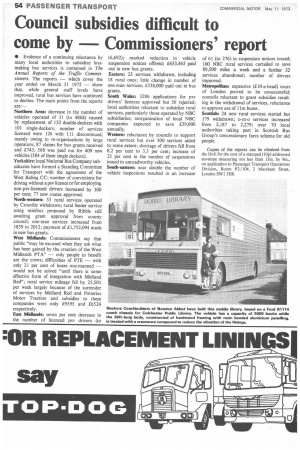Council subsidies difficult to come by Commissioners' report
Page 56

If you've noticed an error in this article please click here to report it so we can fix it.
• Evidence of a continuing reluctance by many local authorities to subsidize lossmaking bus services is contained in The Annual Reports of the Traffic Commissioners. The reports — which cover the year ended on March 31 1972 — show that, while general staff levels have improved, rural bus services have continued to decline. The main points from the reports are:— Northern Area: decrease in the number of vehicles operated of 31 (to 4868) caused by replacement of 132 double-deckers with 101 single-deckers; number of services licensed were 126 with 111 discontinued, mainly owing to re-organizations by large operators; 87 claims for bus grants received and £743, 568 was paid out for 409 new vehicles (384 of them single deckers).
Yorkshire: local National Bus Company subsidiaries have formed a Standing Committee for Transport with the agreement of the West Riding CC; number of convictions for driving without a psv licence or for employing non-psv-licensed drivers increased by 100 per cent; 77 new routes approved.
North-western: 53 rural services operated by Crosville withdrawn; rural feeder service using minibus proposed by Ribble still awaiting grant approval from county council; one-man services increased from 1839 to 2012; payment of £1,752,094 made in new bus grants.
West Midlands: Commissioners say that public "may be excused when they ask what has been gained by the creation of the West Midlands PTA" — only people to benefit are the crews; difficulties of PTE — with only 21 per cent of buses one-manned — would not be solved "until there is some effective form of integration with Midland Red"; rural service mileage fell by 25,501 per week largely because of the surrender of services by Midland Red and Potteries Motor Traction and subsidies to these companies were only £9595 and £6524 respectively.
East hfailands: seven per cent decrease in the number of licenced psv drivers (to
16,692); marked reduction in vehicle suspension notices offered; £653,465 paid out in new bus grants.
Eastern: 23 services withdrawn, including 18 rural ones; little change in number of one-man services; £338,000 paid out in bus grants.
South Wales: 3286 applications for psv drivers' licences approved but 56 rejected; local authorities reluctant to subsidize rural services, particularly those operated by NBC subsidiaries; reorganization of local NBC companies expected to save £39,000 annually.
Western: reluctance by councils to support rural services but over 300 services aided to some extent; shortage of drivers fell from 8.2 per cent to 3.3 per cent; increase of 23 per cent in the number of suspensions issued to unroadworthy vehicles.
South-eastern: near double the number of vehicle inspections resulted in an increase
of 61 (to 276) in suspension notices issued; 100 NBC rural services curtailed to save 89,500 miles a week and a further 32 services abandoned; number of drivers improved.
Metropolitan: expensive (£10-a-head) tours of London proved to be unsuccessful; councils reluctant to grant subsidies resulting in the withdrawal of services, reluctance to approve use of 1 lm buses.
Scottish: 24 new rural services started but 179 withdrawn; o-m-o services increased from 2,187 to 2,279; over 70 local authorities taking part in Scottish Bus Group's concessionary fares scheme for old people.
Copies of the reports can be obtained from the DoE for the cost of a stamped (I0p) addressed envelope measuring not less than 13in. by 9in., on application to Passenger Transport Operations Division, Room P2/104, 2 Marsham Street, London SW I 3EB.



























































































































































































































